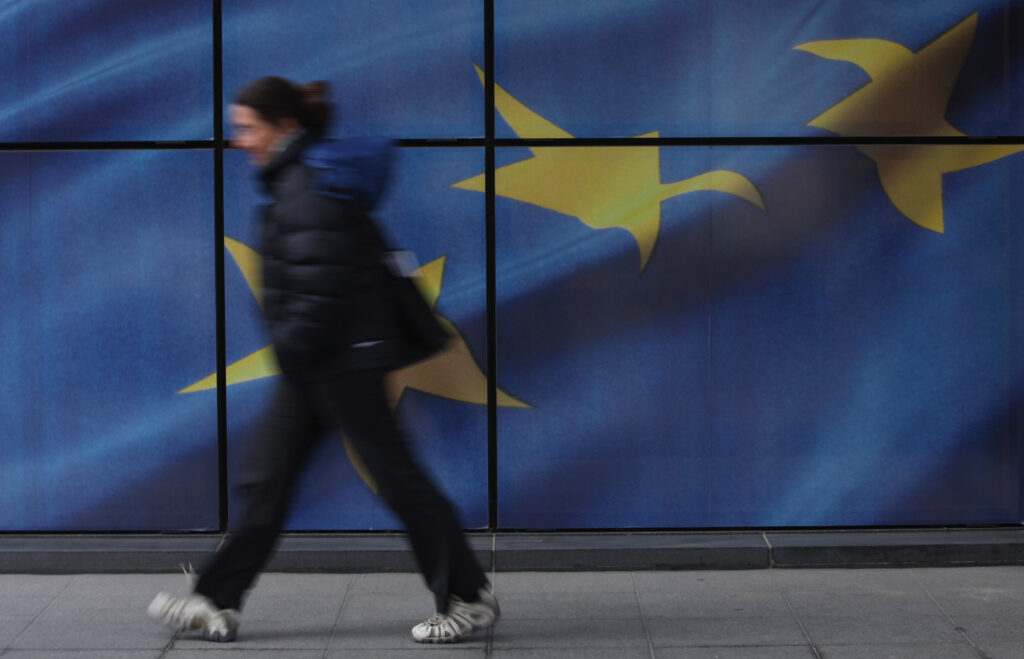
Press play to listen to this article
Voiced by artificial intelligence.
BRUSSELS — A new push from member countries to exempt financial institutions from proposed EU rules on the oversight of business supply chains risks further complicating already thorny negotiations.
The proposed rules, now being negotiated by EU institutions, are meant to compel EU-based companies to police their global value chains for environmental or human rights risks.
Ahead of a fourth — and potentially penultimate — round of negotiations on Wednesday, EU ambassadors have swung behind a long-standing call by France to exempt the entire financial sector. Paris wants to shield its finance houses from the compliance burden such rules would entail as they seek to win new business following the exit of Britain, and its outsized financial sector, from the EU.
A majority voted last week in favor of a proposal from the Spanish presidency of the Council of the EU to “exclude the financial sector from the scope” of the rules and to “delay its extension to this sector to a later stage by adding a review clause.”
But not all countries want a full carveout for the sector, with the Dutch and the Danes among the most vocal critics.
“I always thought that a trilogue is between Council, Parliament and the Commission, but it seems the financial services sector is now an EU institution as well,” quipped one EU diplomat.
Several countries, alongside the EU executive, are therefore floating a new compromise that covers banks and insurers, while leaving out asset managers.
Lobbying war
The question of whether the financial sector should be covered by the Corporate Sustainability Due Diligence rules has unleashed a lobbying war in Brussels.
Proponents — NGOs who want to stamp out evils like child labor and deforestation, as well as a few progressive business bodies — argue that financial institutions should take responsibility for supply chain compliance in the projects they back.
According to sustainable finance think tank Climate & Company, the new rules would provide an incentive “for financial institutions to stop financing harmful activities hidden in their clients’ and investees’ value chains,” arguing that “this is where up to 80 percent of natural capital destruction and the majority of human rights violations take place.”
Critics, in turn, fear that the rules may mean that financial institutions can’t provide certain services to their customers. U.S. investors, asset managers and bankers have also hit out at the proposed rules.
Insurance Europe, which represents European insurers, warned that insurers could be “expected or required to deny provision of a legally required insurance policy because of a due diligence assessment.”

The new stance of the EU majority marks a shift from an earlier position, which would have left the decision to include the financial sector to the discretion of member countries.
It sets countries on a collision course with European lawmakers, who want all sectors — including finance — to police their value chains. That puts negotiators in a difficult spot and under increasing time pressure to hash out a compromise, as the file needs to be wrapped up by mid-February to avoid it falling through the legislative cracks.
Road ahead
While the topic isn’t on Wednesday’s agenda — obtained by POLITICO — as negotiators need time to flesh out their response to the new Council position, it will come to the fore in the closing stages of negotiations.
At last week’s meeting, “the Commission, Germany, Netherlands, Denmark and Finland all called for a constructive solution to ensure the inclusion of banks and insurers under the scope of the directive,” according to the diplomat, who was granted anonymity as they were not authorized to speak on the record.
While proponents of stringent rules still advocate for all financial institutions to be covered by the rules, they acknowledge that a distinction between asset managers and banks and insurance companies is at least somewhat warranted.
“Insurers and [the] banking industry have specific contractual relationships with their clients,” meaning they could police their supply chains based on contractual agreements, said Ingmar Juergens, the CEO of Climate & Company.
“That does not hold for asset managers,” he added, pointing out that they are, however, “pretty much aware of the sustainability implications of their equity investments.”
Aleksandra Palinska, executive director of the European Sustainable Investment Forum, said that including all financial institutions would “support risk management” by making sure they are better aware of their investments’ sustainability risks and negative impacts.
She conceded that very large asset managers are already required to disclose their due diligence on investments in the EU’s Sustainable Finance Disclosure Regulation, but added that, given the regulation is disclosure-based, reinforcing the obligations for financial institutions in the new due diligence rules would be important.
The European Banking Federation and the European Fund and Asset Management Association did not respond to requests for comment.






